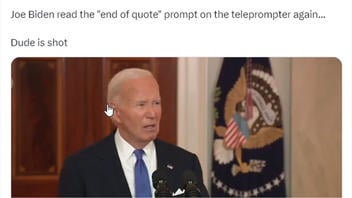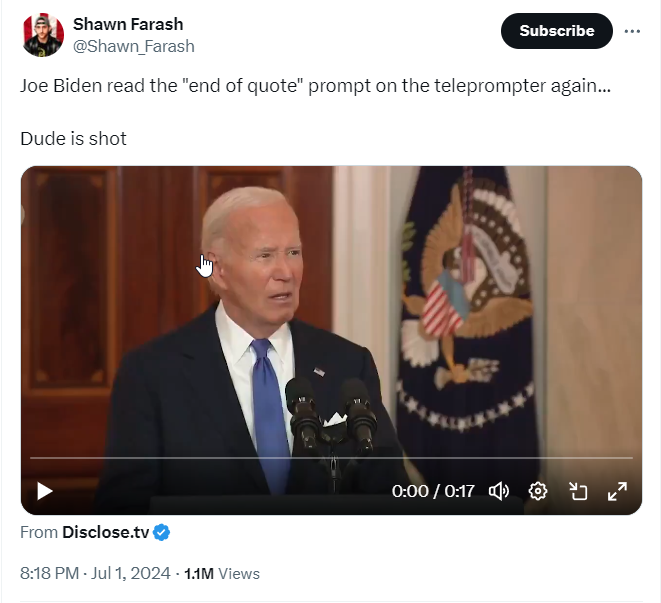
Did President Joe Biden err in saying "end of quote" in his remarks after the Supreme Court decision on presidential immunity on July 1, 2024, as some social media posts implied? No, that's not true: There are many ways of signifying a quote in spoken language, including the use of "quote-unquote" or "quote-end of quote" to set off the quoted material. Public speaking experts told Lead Stories that there's nothing wrong with saying it that way.
The claim appeared in a post and video (archived here) published on X, formerly Twitter, on July 1, 2024. The post's caption said:
Joe Biden read the 'end of quote' prompt on the teleprompter again...
Dude is shot
This is what the post looked like on X at the time of writing:
(Source: X screenshot taken on Tue Jul 2 14:21:19 2024 UTC)
The video
Biden did indeed say "end of quote" during comments he made at the White House on July 1, 2024. The fact is confirmed by the 16-second clip included in the social media post and by an official transcript provided on the White House website. Near the end of his remarks, the president said:
I concur with Justice Sotomayor's dissent today. She -- here's what she said. She said, 'In every use of official power, the president is now a king above the law. With fear for our democracy, I dissent,' end of quote.
The post provided no attribution or other evidence to substantiate its claim that the "end of quote" comment by the president was meant to be a "prompt on the teleprompter" rather than an intentional part of his remarks.
Public speaking experts
In a July 2, 2024, email to Lead Stories, Matt McGarrity, founder and director of the Center for Speech & Debate at the University of Washington, said Biden's method of attribution -- saying "end of quote" -- is acceptable. He continued:
Language is pliant and I've heard people orally quote speech in a ton of ways. Written language deals really well with cited language because it can mark it graphically. Spoken language doesn't have the same tools. I personally hate finger air quotation marks, but it's really common. Largely a matter of style.
Diana Leonard, director of public speaking at the University of Arizona's Department of Communication, told Lead Stories in a July 2, 2204, email that there's no problem with using "end of quote" when verbally quoting someone. She said:
It is absolutely not wrong to say, '...and I quote...' or simply, 'quote', before you quote the material that is someone else's words; and then end with, 'end quote' or 'end of quote' or 'unquote' at the conclusion of the other's words.
A speaker can also choose to skip saying 'quote' and instead pause before changing their voice when quoting the material, and pause again when returning to their own material with their own natural voice.
One caveat however: in all circumstances, if you are specifically stating that this is a quote from someone else, it must be accurate, precisely repeated, and not taken out of context that might change the meaning of the quote.
In another July 2, 2024, email to Lead Stories, Faber McAlister, coordinator of public speaking instruction at Drake University in Des Moines, Iowa, said Biden's style of public speaking is a "common way for a speaker to attribute a quote to another source to avoid plagiarism." McAlister continued:
It can be difficult for a speaker to signal to an audience that words or phrases are not their own. This is why we hear speakers saying '...and I quote,' 'that was a direct quote,' 'end of quote' and so on. A written text has quotation marks and parentheses to attribute phrases to sources, but public speakers must translate these for a live audience.
White House website
Using Google Advanced Search on July 2, 2024, Lead Stories found the term "end of quote" (archived here) used dozens of times by the president in transcripts of his public comments. Biden also often leads into the quotes of others with "and I quote."
Read more
At the time this was written, multiple fact-checking organizations covered similar claims in previous speeches, including Snopes, Newsweek and USA Today in 2021 and FactCheck.org in 2022.
Additional Lead Stories fact checks on claims involving Biden can be found here.


















